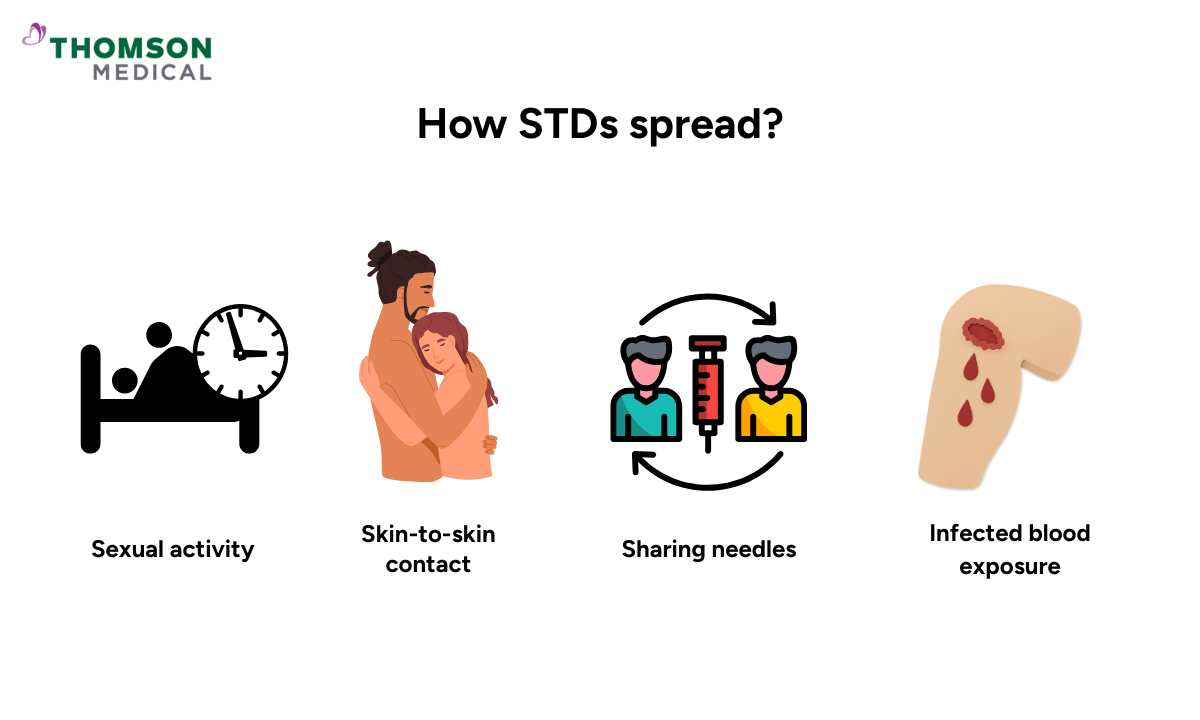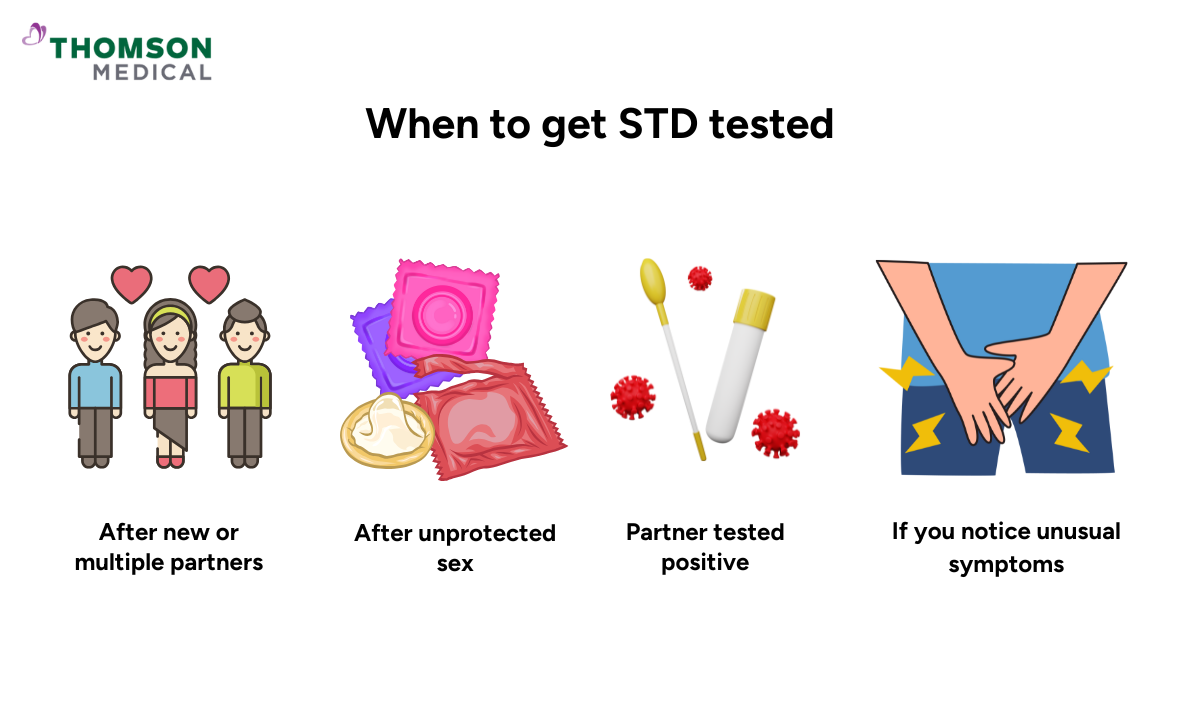Discussing sexually transmitted diseases (STDs) can be awkward and shameful, so many men avoid the topic altogether when talking to their partner. However, staying silent won’t keep you and your loved ones safe – having an open and honest conversation does.
STDs are more common than most people realise, and they don't always present with obvious symptoms. Some infections stay quiet for months or even years, potentially affecting your long-term health in the process. However, recognising symptoms when they occur gives you a chance to act before complications develop.
What are STDs?
STDs are infections passed between people during sexual contact. This includes vaginal, anal, and oral sex, though some infections can also spread through skin-to-skin contact in intimate areas. You might hear them called STIs (sexually transmitted infections) as well. Both terms describe the same thing, though STI is sometimes used when there are no symptoms yet.
The tricky part is that many men with an STD are unaware of their infection. Symptoms might be so mild you barely notice them, or they might not show up at all for a long time. That's why testing regularly is important, even when everything feels fine.
What causes STDs?

Different types of microbes cause STDs, and each one behaves a bit differently in your body. Some are easier to treat than others, but all of them spread through close contact.
The three main microbes are:
Bacteria that cause infections like chlamydia, gonorrhoea, and syphilis
Viruses include HIV, herpes, HPV, and hepatitis B
Parasites that cause trichomoniasis
These infections spread in several ways:
Through sexual activity with someone who's infected
Direct contact between skin in genital areas
Sharing needles with someone who has an infection
Exposure to infected blood
How do STD symptoms show up in men?
One of the most challenging aspects about STDs is how often they remain hidden. You could have an infection and feel completely fine, while in fact your body is dealing with something that needs treatment.
When symptoms do show up, you may notice the following:
Discharge from your penis that looks or smells different than usual
A burning feeling when you pee that won't go away
Sores, blisters, or unusual bumps around your genitals
Swelling or pain in your testicles
Ongoing itching or irritation around the genitals
Pain or discomfort during an intercourse
A rash that appears without explanation
These signs can easily be confused with other health issues, which is why guessing doesn't work. Testing is the only way to know for sure what's going on.
If something feels off or you've noticed any of these symptoms, schedule an appointment with Thomson Medical. Our obstetrician and gynaecologist (O&G) specialists can help identify the cause and guide you toward the right treatment.
Common STDs that affect men
Every STD has its own characteristics. Some are easily cured, others need ongoing management, and some can cause serious problems if ignored. Knowing what's out there helps you understand what you're dealing with if you do test positive.
Here's a breakdown of the most common infections in men:
| STD | Cause | Common symptoms in males | What you should know |
|---|---|---|---|
Chlamydia | Bacteria | Burning when you urinate, discharge that's clear or cloudy, and pain in your testicles | Often shows no symptoms at all, which is why it spreads so easily. Can negatively affect fertility if left untreated. Antibiotics clear it up completely. |
Bacteria | Burning during urination, thick discharge (yellow or green), and swollen or painful testicles | Usually causes symptoms within a week. This condition can lead to both fertility issues and pain. Some types resist treatment, making early detection important. | |
Bacteria | Stage 1, a painless sore Stage 2, rash, fever, and swollen glands Stage 3, damage to organs | Gets worse over time if ignored. Can affect your heart, brain, and nervous system. Antibiotics work at any stage. | |
Virus (HSV-1 or HSV-2) | Painful blisters or sores around your genitals, flu-like symptoms when it first appears | Can't be cured, but antiviral medication keeps outbreaks under control and reduces the chance of spreading it. | |
Genital Warts (HPV) | Human Papillomavirus | Small bumps that might cluster together, sometimes looking like cauliflower | Certain types can lead to cancer of the penis, anus, or throat. The HPV vaccine protects against high-risk strains. |
Hepatitis A | Virus | Fatigue, fever, nausea, stomach discomfort, and yellowing of the skin or eyes | It spreads through contaminated food or water, as well as through oral or anal contact. Usually clears on its own but can cause severe illness. Vaccine available and works well. |
Hepatitis B | Virus | Tiredness, nausea, yellowing of the skin or eyes, and stomach pain | Can turn into a long-term infection that damages your liver. Vaccine available and works well. |
HIV/AIDS | Human Immunodeficiency Virus | Early on, you experience flu-like symptoms. Over time, the immune system weakens. | There's no cure yet, but antiretroviral therapy (ART) can help slowing its progression and stops you from passing it on. |
Trichomoniasis | Parasite | Irritation inside your penis, burning after you pee or ejaculate, and watery discharge | Most men don't notice symptoms but can still give it to partners. One round of antibiotics can help to treat this STD. |
When should you get an STD test?

Counting on symptoms to alert you is risky and often too late. Most infections don't show up right away, and by the time you notice something, you might have already passed it to someone else.
Think about getting tested if you:
Have had sex with someone new or with multiple partners
Do not use protection during sex
Have noticed unusual symptoms such as discharge or sores
Are starting a new relationship and want to know your status
Have a partner who tells you they’ve tested positive
Have shared needles
Are planning to have children with your partner
Why is STD testing so important?
You might be wondering if testing really matters when you feel fine. Here's why it absolutely does:
Catching infections early stops them from causing permanent damage like infertility, chronic pain, or life-threatening illness.
Giving you clarity about your status so you can protect your partners.
With test and early treatment, bacterial infections can be completely cured, and viral ones can be controlled to prevent complications.
Testing might seem like an inconvenience when nothing feels wrong, but your doctor can walk you through everything and help you figure out the right approach for your situation.
Our specialists
Loading...
How can you prevent STDs?
Protection works best when you combine different approaches rather than relying on just one method. Here are some preventive measures that can help reduce your risk:
Get vaccinated against hepatitis B and HPV
Be selective about sexual partners
Use condoms or dental dams consistently during sexual intercourse
Never share needles
See your doctor regularly for check-ups
Regular appointments keep you up to date on your sexual health. These visits give you space to bring up concerns, talk through any symptoms you've noticed, and figure out testing plan that fits your lifestyle.
Regular appointments keep you up to date on your sexual health. If you'd like to discuss your sexual health concerns or create a testing plan that fits your lifestyle, schedule an appointment with Thomson Medical. Our specialists provide confidential consultations where you can discuss openly about any symptoms or questions you may have.
Where can you get tested and vaccinated?
Singapore has plenty of accessible options for STD testing and vaccines. You can visit public polyclinics and hospitals for subsidised testing, or choose private clinics if you prefer faster results and complete discretion. At-home test kits are also available for some infections, letting you collect samples in private.
FAQ
How do you know if you have an STD as a man?
Many infections stay quiet in the beginning, so you might not realize anything's wrong. Symptoms like burning when you urinate, unusual discharge, blisters, or sores can signal an infection, but plenty of STDs cause no symptoms at all. The only way to know for certain is through testing at a clinic or with your doctor.
What does male STD discharge look like?
It varies depending on the infection. Gonorrhoea usually produces thick discharges that's yellow or green. Chlamydia tends to cause something clearer and more watery. Trichomoniasis can create discharge that's frothy or has an odd smell. Any discharge that seems unusual for you deserves a doctor's attention.
Are STDs curable for men?
Bacterial and parasitic infections like chlamydia, gonorrhoea, syphilis, and trichomoniasis can be completely cured with the right medication. Viral infections like herpes, HIV, and hepatitis B don't have cures yet, but they can be managed effectively with treatment.
How long does an STD last in men?
It depends on the type and whether you get treatment. Bacterial and parasitic infections usually clear up within days to weeks once you take medication. Viral infections typically persist for a long time, but treatment keeps them under control. Without treatment, many STDs can persist for months or years and potentially cause permanent damage to your fertility or organs.
Do condoms prevent STDs?
Condoms are one of the most effective tools for reducing STD risk, especially for infections that spread through body fluids like chlamydia, gonorrhoea, and HIV. However, they don’t offer complete protection. Infections like herpes, HPV, and syphilis can spread through skin-to-skin contact in areas a condom doesn't cover. Using condoms consistently, getting vaccinated, and testing regularly gives you the strongest protection.
What increases STD risk in males?
Several factors raise your chances of getting an infection. Having unprotected sex with new or multiple partners increases risk significantly. So does having partners whose STD status you don't know. Sharing needles and having a history of previous STDs also elevate your risk.
The information provided is intended for general guidance only and should not be considered medical advice. For personalised recommendations and tailored advice based on your unique situations, please consult a specialist at Thomson Medical. Request an appointment with Thomson Medical today.
For more information, contact us:
Thomson Specialists (Women's Health)
Thomson Women's Clinic (TWC)
- Novena:
6592 6686 (Call), 8611 8986 (WA) - Bukit Batok:
6569 0668 (Call), 8686 3525 (WA) - Choa Chu Kang:
6893 1227 (Call), 8282 1796 (WA) Jurong:
6262 8588 (Call), 6262 8588 (WA)- Katong (female doctor):
6970 2272 (Call), 8611 9020 (WA) - Punggol:
6243 6843 (Call), 8811 0328 (WA) - Sembawang: 6753 5228
- Sengkang: 6388 8125
- Serangoon (female doctor): 6382 3313
- Tampines: 6857 6266
- Tiong Bahru: 6276 1525
